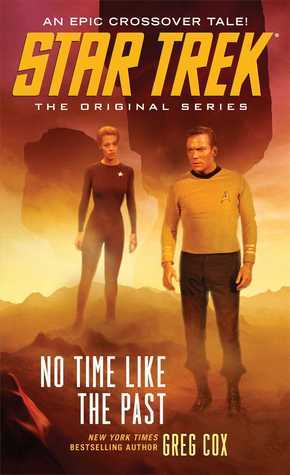Moments Asunder (MA) by Dayton Ward; The Ashes of Tomorrow (AoT) by James Swallow; Oblivion’s Gate (OG) by David Mack
Genre: sci-fi
Setting: spaaaaaaaaaaaaace!
I read it as a(n): paperbacks
Source: my own collection
Length: 368 (MA), 368 (AoT), and 448 (OG)
Her Grace’s rating: out of 5 stars
**There are spoilers below. You have been warned.**
Before beginning my own review, I think it would be helpful to share this exceptional, self-described “high speed crash course” summary of all the relevant Lit-verse post-series relaunch novels that lead up to the events depicted in the Coda trilogy.
Have you finished reading that now? I hope so, because there is no way I can summarise all of the relaunch novels, and certainly not as nicely as Alvaro Zinoas-Amaro did up there.
Given that there was not any new TV or film material to build on, it made sense that the post-series books would attain a life of their own. What followed was a vastly complex, intertwined mingling of stories, series, and characters that developed further the massive fanwank litverse of Star Trek. But then Star Trek: Picard began and it became clear that the relaunch books no longer bore any resemblance to the official canon of Trek. This Coda trilogy was designed to wrap up all the various relaunch storylines that sprang into existence in the 20 or so years since the end of all the Trek series.
Fucking finally.
Don’t get me wrong. I love Star Trek in just about any form I can get it. That held true – and still holds true – for the rich litverse as well. But OMG, you guys, I’m so sick of the massive, overarching, crossover, mingled serial plots. I actually started feeling a little resentful that I had to read nearly every Trek novel after a certain point just to keep up with the story, even if it wasn’t a series that I really wanted to read about.
With the conclusion of the relaunch books, I devoutly hope that it signals a return to the single story format. One book equals one story. I miss the old numbered paperbacks. I could read those when I wanted, in whatever order I wanted, could skip books from my less-beloved series if I wanted, and never missed out on any part of the actual necessary plot. There have been a couple episodic novels fairly recently, and they were awesome. Dear Star Trek authors – please, PLEASE return to episodic novels, even if the various TV series don’t.
That said, I am very much looking forward to new Trek books, ESPECIALLY Discovery and Strange New Worlds. I’m digging Disco right now and am pumped for SNW. Anson Mount’s Capt. Pike is fucking awesome.
So. The books. First thing to note, for anyone who hasn’t yet read these, nothing is sacred and not one single character is safe.
Moments Asunder by Dayton Ward started the trilogy off, setting the stage for a cataclysmic disaster involving the very existence of time itself. The Devideans – remember the weird glowy dudes from the “Time’s Arrow” episodes in 1800s San Francisco? They’re back – have figured out how to feed not only on specific periods of time where there were a lot of people suffering. They figured out how to destroy entire universes and timelines to feed on an infinite number of people.
Wesley is central to alerting Picard about the Devideans. His powers as a Traveler are the main reason the rest of Starfleet learns about the threat to their existence. Of course, it wouldn’t be normal if everyone believed Wesley or Picard immediately, so they have some work to do. Ezri Dax and her crew, along with all of Deep Space Nine, witness firsthand the Devideans and the creatures they’ve created, the phased serpent-like Nagas, and how a mere touch from a Naga can instantly age anything to death, from ships and metal to sentient beings. Naturally, Picard et al. are going to want to fight that.
Moving into The Ashes of Tomorrow by James Swallow, readers get the rising action and honestly, I blew through this book in about 3 days. It was fast paced and exciting. Picard and Wesley head to Starfleet HQ to convince Admiral Akaar and President Kellessar zh’Tarash but are floored when everyone wants to take a wait-and-see approach. Like, they are literally running out of time period, let alone time to do anything, so wait-and-see is a really stupid idea. Naturally, Picard takes matters into his own hands, aided along the way by the likes of Benjamin Sisko, Tom Paris, B’Elanna Torres, Odo, Quark, Miles O’Brien, and many others we’ve seen over the years.
Their plan? They figure out that the Devideans are using the Bajoran wormhole as a staging ground for their temporal incursions into this timeline. So naturally, the plan is to close the wormhole. Permanently. At both ends. Beyond that, they actually need to totally destroy it. You can imagine what that means to the Bajorans who view the wormhole as their Celestial Temple and the home of their gods.
Throughout AoT and Oblivion’s Gate, Rear Admiral William Riker goes completely off his nut. At first, readers assume it’s just because he’s righteously pissed that Picard not only went rogue but that he talked a shitload of other people into going along with his plan. As the story progresses, it becomes clear that Riker is suffering some kind of bad effects of the weird temporal shifts caused by the Devideans, resulting in what is termed Temporal Multiple Personality Disorder. Worf is also affected, but he is cured through a mind meld with none other than Ambassador Spock.
In the final book of the trilogy, Oblivion’s Gate, the mission becomes desperate. Multiple timelines are at play and the mission now is to shut down a splinter timeline that never should have happened. Doing so will prevent the Devideans not only from feasting on the neural energy of billions of sentient beings, but also from annihilating time itself. To accomplish their mission, Picard and friends have to find the core of the Devideans’ temporal base, sync it with the timeline that shouldn’t exist, and obliterate the core. Oh, also, Kira Nerys has to take the Orb of Time into the Bajoran wormhole, which is always a good time. And K’Ehleyr is there, too! When they go to the Mirror Universe for help. Because that happens, too. K’Ehleyr is fucking awesome. One of my favourite lines in the trilogy was about her: “This is what it means to be Klingon. To savor the cries of my enemies and feel their blood on my face … My Klingon ancestors would be proud. … She let go of her life, aglow with pride. Prepare a feast, heroes of Sto-Vo-Kor – a family of warriors is coming (Mack 379-380).
Overall, I think Ward, Swallow, and Mack did a great job wrapping up the relaunch books with this trilogy. Of the three, my least favourite was the first, Moments Asunder. I love Star Trek and normally I don’t mind Dayton Ward’s writing, but the first probably 75% of MA was just a total slog for me to get through. It was just so boring. I almost didn’t bother to pick up the rest of the trilogy. It only picked up the pace in the last quarter or so, and mainly because he killed off Ezri Dax. I’m glad I DID finish reading the trilogy, though, because as I mentioned earlier, Swallow’s contribution was action-packed and fun, and Mack’s was similarly fast-paced and also really touching.
In the end, I think the only thing I would have done differently would have been to find a way not to have to collapse the splinter timeline. It is Star Trek, after all. Amazing, 11th-hour rescues full of technobabble and marvels of engineering should always happen in Star Trek.
But ultimately, it doesn’t matter when, how, or whether it’s expected. It hurts every time.


 Romeo and Juliet
Romeo and Juliet  Seveneves
Seveneves  The Invisible Hour
The Invisible Hour  A Stitch in Time
A Stitch in Time 
 Girls and Their Horses
Girls and Their Horses  Mercy Rule
Mercy Rule 



 To Lose the Earth
To Lose the Earth 
 Star Trek TNG: Collateral Damage
Star Trek TNG: Collateral Damage 